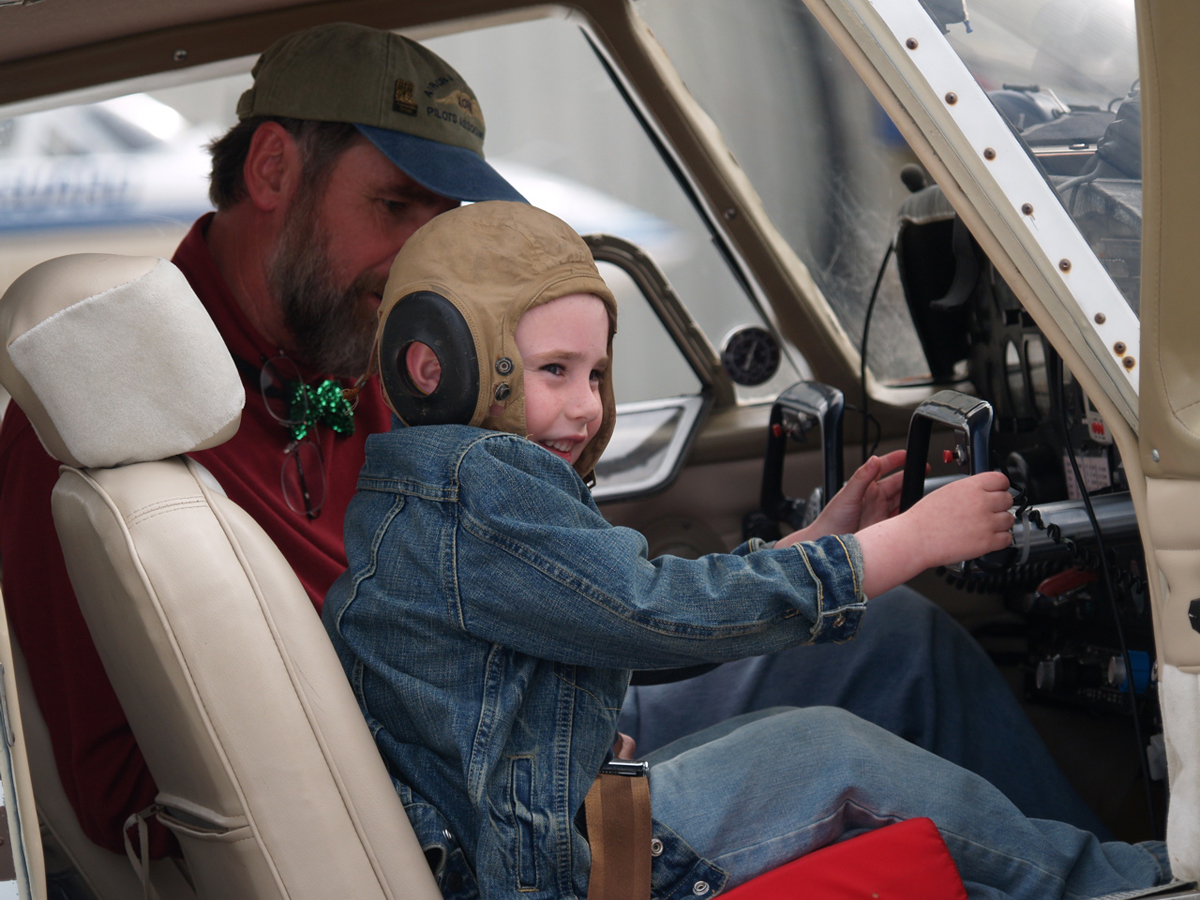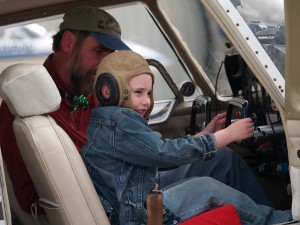
Challenge Air Fly Days focus on the children’s abilities and shows them, through example, the many possibilities available to them. Some of the children fly the airplane for almost the entire flight.
By Henry M. Holden
“If you can fly this plane, what can’t you do?” That was the challenge Theron Wright, a wheelchair aviator, made to disabled and seriously ill children at the Challenge Air Fly Day on March 17. The Fly Day, hosted by MAV Aircraft Services of Fort Worth, Texas, took place at Meacham International Airport.
“Tohnni Jones, the president of MAV, was very impressed with this event,” said Byron Laszlo, Challenge Air’s executive director. “We’re planning another Fly Day with her and MAV for September 15.
Jones said that the Fly Day was intended for the benefit of the children, but others also got a lot out of the event.
“Seeing the excitement and gratification on the faces of the children as they disembarked after their wonderful flights left everyone, including the volunteers, with a wonderful feeling of accomplishment,” she said.
The late Rick Amber, a Vietnam fighter pilot who crash-landed on an aircraft carrier and became a high-functioning quadriplegic, formed Challenge Air, for Kids & Friends in 1993. Since then, Challenge Air has inspired 22,500 physically challenged children in 21 states.
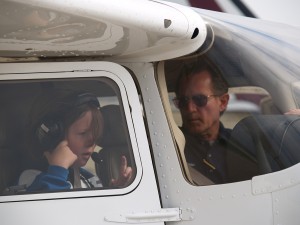
Pilot Steve McCarter, 22 other general aviation pilots and 103 ground crew volunteers donated their services to fly Nicholas Campbell and 120 other children at the event. Each flight took about 30 minutes.
“We pre-registered 148 children, all with special needs—some kind of physical disability or life-threatening illness,” said Laszlo. “One hundred twenty-one showed up for our flight program.”
Those children are encouraged to sit in the right seat as copilot. Laszlo said they want the Challenge Air program to be a family experience, so on the 121 flights that were made, 114 adults and 77 other children were backseat passengers.
“Most of our volunteer pilots have four- to six-seat airplanes, so family members can share the experience,” he said.
Laszlo said it was a perfect flying day.
“The skies opened up for Challenge Air,” he said. “It was about 65 degrees and the sky was cloudless.”
The event is well organized. Each child attends ground school before his or her flight.
“We have a little yellow Piper Cub we use for the ground school,” said Laszlo. “It’s generally taught by another wheelchair aviator. It’s here where we first introduce the concept of flying to the children. We talk about the parts of the plane and the forces of flight. Then we talk to the children about what they’ll do in the right seat. Part of our message of the day is, ‘If you can fly this plane, you can do anything you put your mind to—the sky is the limit.'”
Laszlo said it’s often a challenge for the children to grab the yoke to fly the plane, but they’re encouraged by the pilots and helped with the task.
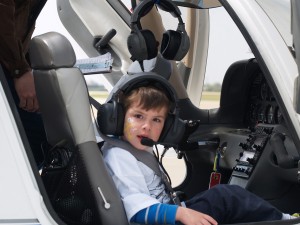
Tommy Krisp had his face painted before his flight. The pilots enjoy working with all the young copilots, but it’s an added blessing when a child really gets into flying. The pilot helps the copilot make left and right turns.
“So many of our kids are in wheelchairs or leg braces, or have major atrophy in their hands,” he said. “Once they do it, it gives them a feeling, and a freedom of movement that only flight can give.”
Most of the children are in the 7 to 17 age range, but Challenge Air has flown children as young as 5. The special copilots have also been as old as 30.
“We feel the program sends a message to so many age ranges,” says Laszlo. “The average age is about 12, but we may have individuals in their 20s who’ve had a recent spinal cord injury, and this program gives them a powerful message: ‘Some of these people in wheelchairs are flying airplanes, and I’m flying an airplane today!’ It’s such a huge self-esteem boost for them.”
For many children, Challenge Air offers their first flight ever. The program empowers and inspires all participants and their families to look beyond their perceived limitations. Each flight is over a predetermined flight pattern. They fly over Fort Worth, some landmarks, and over water at about 1,500 to 2,000 feet.
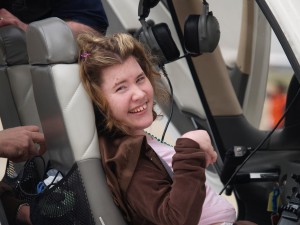
A young aviator prepares to take to the skies with Challenge Air over Ft. Worth, Texas. Part of the flight experience allows each child with special needs to take the controls of the small single engine plane.
Brodie Sharp, who is now 18 and in a wheelchair, took his first flight about eight years ago. Cerebral palsy has left him with major atrophy in his hands and a speech impediment, which he works on every day.
“Brodie now wants to help us recruit more kids into the program,” said Laszlo. “This year, for the first time, he joined with the other kids in the ground school. He shared his experiences from his perspective with the other kids and parents, and helped encourage the kids.”
Laszlo said that one parent from San Diego, who really wanted her daughter to experience the flight, came to four events in a row. Her daughter has Down syndrome and fell asleep before each flight.
“The sound of the airplane would put her to sleep, so she never got to fly the airplane,” he said. “On her fifth try, she stayed awake.”
After they got home, the mother found out that her persistence was worth it. One of their major challenges had been medication. Every day the child had to take a pill, but she wouldn’t take it whole, so they had to break it into pieces and then dissolve it.
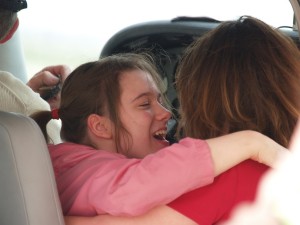
New children to the event represent about 63 percent of Fly Day participants. They’re always encouraged to come back for future Fly Days.
“After the flight, she told her mother; ‘I flew with Challenge Air today, and now I can take my pill whole,'” Laszlo related. “This may feel like a little thing to us, but it was a monumental step forward for that family. The power of the program encouraged her to look beyond her challenges and showed her that she can do things she doesn’t really want to do, or thought she couldn’t do. Little things like that are big things for the parent, and that’s the message we send out.”
Challenge Air is able to provide these once-in-a-lifetime experiences through foundation support, corporate and individual donations and sponsorships. The volunteer organizations involved with ground logistics included The Skyline Aces, Washington Mutual, University of North Texas and Grapevine AMBUCS. Twenty other local nonprofit organizations were on hand to share their services with the families and children.
Several more Fly Days will be held this year. Locations will include Houston, Fort Worth, McKinney and Mesquite, Texas; Smyrna, Tenn.; Portland, Ore.; Oklahoma City, Okla.; Kansas City, Mo.; Orlando, Fla.; Seattle; Los Angeles and San Diego.
For more information, visit [http://www.challengeair.com].











